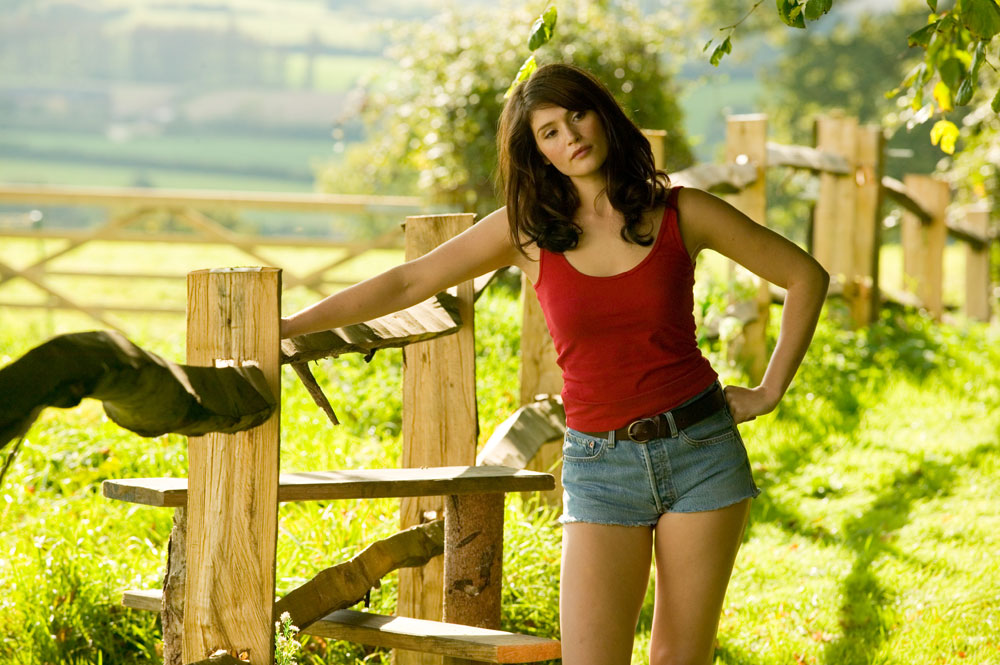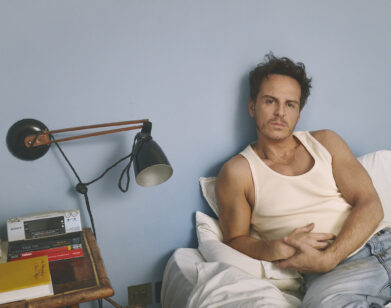Gemma Arterton: Damsel No More

GEMMA ARTERTON IN TAMARA DREWE. PHOTO COURTESY SONY PICTURES CLASSICS.
After fighting off gods and monsters in Clash of the Titans and Prince of Persia, Gemma Arterton is tackling the treacherous countryside in this week’s Tamara Drewe. Playing the title character, Arterton is no longer just a damsel in distress—she’s the distress itself, wrapped up in a comically small pair of cut-offs. Initially a romantic comedy, the film ends up as a study of life in a small town and all the chaos beneath the surface. Arterton as Drewe shows up at the beginning of the film with a new wardrobe and new nose, ready to cause mayhem. Drewe is a beautiful, successful gossip columnist who is still getting over her ugly duckling past. Arterton, who quite possibly has never had a bad hair day in her life, gets to play off her fabled looks when she takes a turn as Drewe’s big-nosed teenage self. In person, Arterton is much funnier than someone so gorgeous should be allowed to be; we caught up with her New York and found out about her experience playing an accidental prank on one of the crew.
MOHNEY: Were you familiar with the story beforehand—had you read the comic before?
ARTERTON: No, I hadn’t. I was ignorant, because I’m not really into the whole graphic novel thing, but I read the script first and I met Stephen [Frears] and he offered me the role. I loved the script; I remember my initial reaction was that it was so unique, fresh, “a new thing,” charming, and really good character study, but I couldn’t quite put my finger on it. I think that’s what the initial reaction to the film is that “what is it, what is it.” I remember thinking if this isn’t done properly it could be awful. I’m utterly proud of this film because everybody’s responsible for the tone of it, being what it is.
MOHNEY: Right, it is very dark in certain places and very funny.
ARTERTON: Stephen had all these characters to look after as well. He expertly directs this film— genius. The first time I watched it, I was obviously neurotically worried about my performance. And the second time I watched it, I absolutely loved it, because I saw all of the details. Stephen cast me in an incredible sort of way. He had never seen me in anything, but heard things about me and met me and went, “Yeah you do it.”
MOHNEY: Wow. So did you read at all?
ARTERTON: No, and I was a neurotic actress going “Please, can I read for you, just so you know you made the right decision.” He said, “I know I made the right decision.” He has an amazing confidence in his gut in what he thinks is right, and that’s how he directs. It’s so refreshing because I’ve worked with directors who had not been confident at all. You need that confidence. He fields his way through it, he doesn’t necessarily have an idea of how it’s going to be. He’s adaptable, amazing, and I could go on and on about him all day.
MOHNEY: You’ve really been doing big movies for two years—you kind of shot out of the gate. Is there something you’re dying to play?
ARTERTON: I’m always surprised at what I actually end up doing because I don’t have a strategy or a game plan, especially now that I’m making my own choices. I love strange things; my favorite movies are weird, eclectic, and intriguing. I’m attracted by stories more than anything and that’s one of the reasons why I was attracted to Tamara Drewe. It wasn’t so much the character but the whole piece. I’m just about to start another play on Monday and that’s a massive departure. It’s Ibsen—very dark, strange, psychological, mystical, and just odd… but really intense. Next year I have lots of projects I’m attached to. Honestly it’s as simple as if I read a script and it makes me tick [snaps fingers.] You have to live with this thing. You have to do it for six months and then you have to publicize it. If you’re not into it or doing it for the right reasons, which I have done as well, then it’s really tricky. You can’t connect with something you’re not passionate about. I’ve got to think about this thing for a year so it better be really interesting. It doesn’t matter whether it’s a big movie or small movie—anything, I’m happy to do anything. So we’ll just see.
MOHNEY: I think this was really interesting because it’s not perfect at the end.
ARTERTON: It’s bittersweet, yeah. I’m a big advocate for movies that leave you going “What—why? why?” and that don’t satisfy you. In the book the ending is dark but sugar-coated. It’s the same with the movie. Everybody ends up resolving it, but not really, and they end up doing the dishonest thing… If you see the poster and think, “Oh, it’s just about this girl in hot pants,” when they come and see it, I hope they’re surprised.
MOHNEY: It’s a great ensemble piece. Obviously the title is a name so you think it’s going to be this one girl finding herself…
ARTERTON: And why would you care about some girl who’s promiscuous? But actually she’s not really the lead. I suppose its called Tamara Drewe because she’s the reason all this stuff happens…But I think you empathize the most with Beth and you feel the most for her. You’re following this story of [put upon wife] Beth Hardiment and the little girl Jody; those are the two that lead you through the story and narrate it in a way. For me it was great because I would have freaked out if I was the lead and it was a big role…it’s nice to know you’re surrounded by an ensemble cast. For me, that’s an attractive prospect when I read a script.
MOHNEY: You got to wear a prosthetic nose. Did anyone treat you differently when you had the nose on?
ARTERTON: Yeah, actually, they did. I decided not to tell anybody when I was going to get dressed up in the nose, to see their reactions. I looked kind of asexual, with my boobs strapped down, and I had a bowl haircut. I went on set and I made myself a cup of tea. One of the runners said to me, “Don’t make yourself tea, it’s for people working in the film.” So I said “Oh, ok.” And I thought “That’s interesting.” Then I went over to Roger Allam, who plays Nicholas Hardiment, and I went “Hello!” He walked off and ignored me completely. He probably thought I was a weird schoolgirl with a big nose that comes in and invades the set and makes herself a cup of tea. And then somebody that works on the film came up and started talking to me. He was a stunt man and was [talking] himself up quite a lot. I was laughing along thinking, ‘Oh you so don’t know it’s me, do you.’ At lunch time he came up to me and said, ‘It’s nice you get to play Gemma Arterton’s younger self.’ I was in disbelief and said ‘It is me.’ He was utterly embarrassed because he had been [talking] himself up a lot. But for me it was really interesting… especially when Roger ignored me. I felt really ugly and unimportant, and invisible. And that’s how Tamara feels. Even though she plays at being this very confident, self assured, witty, gorgeous, and sexually confident character, she’s still that girl inside. Just because she’s got all that cosmetic surgery and hair—she is still that girl. I still have that noise actually. [Chuckles]
MOHNEY: Are you going to wear it around London?
ARTERTON: Well, I need an expert prosthetics man to put it on, but I loved it so much. The make-up artist, Daniel, gave it to me. I left with a picture of me wearing it scowling. It’s in my bathroom. Just as a reminder of what could have been.






